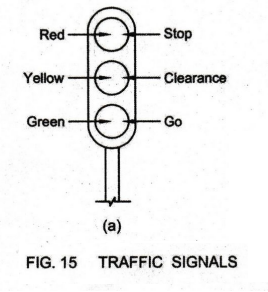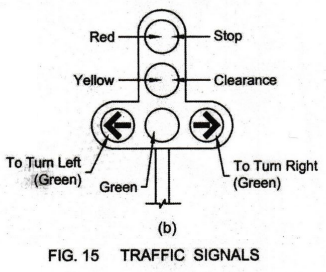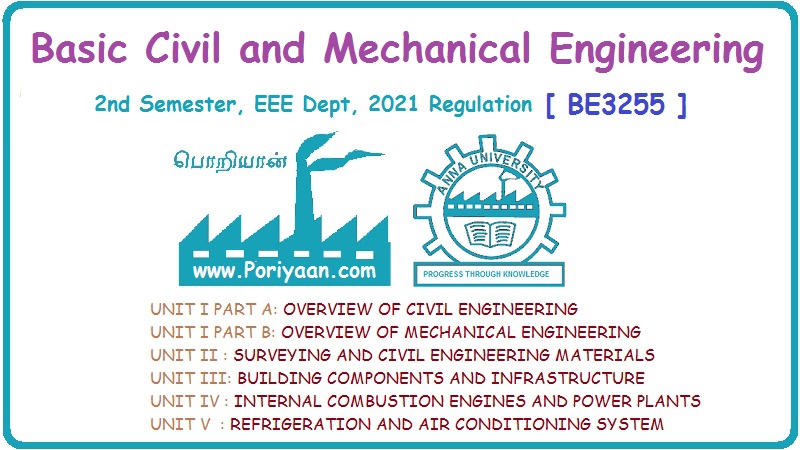Basic Civil & Mechanical Engineering: UNIT I: g. Transportation engineering
Traffic signals
Uses, Time Cycle, Classification, Purposes, Characteristics
A Traffic Signal or Road Signal is a traffic control device or sign, operated by electrical power.
TRAFFIC SIGNALS
A Traffic Signal or Road Signal is a traffic control device or sign, operated by electrical power.
Uses. It is used to regulate the traffic. An indication of
traffic signal directs the traffic to stop, to get ready and to proceed
alternatively. Road signals are erected on the edges of roads or at the islands
in road junctions. In multi-lane traffic roads, the signals are positioned at a
height sufficiently above the passing vehicles so as to have good visibility
from a long distance.
See
Fig. 15(a). Green, Yellow and Red are the color signals used.

Green
indicates, the permission to go. Yellow signifies 'to get ready to stop'. Red
indicates a mandatory stop of vehicles.
These
three signals are arranged vertically in the order shown. See Fig. 15(b).

Sometimes,
two more signals for left and right turns are also provided.
Time
Cycle: The number of seconds required for one complete
sequence of signal indications, i.e., green-yellow-red is called a Time Cycle.
A
Free-Left turn is signified by a continuous flickering of green on the
left-side signal. At the ends of pedestrian crossing, green man signal
indicates ‘go' and red indicates 'stop'.
In
important locations, continuously flickering signals in red or yellow color
will be provided. The flickering indicates “to proceed with utmost caution'.
1. CLASSIFICATION OF TRAFFIC SIGNALS
1.
Fixed Time Signals: These signals are set to repeat
regularly a cycle of green-yellow-red lights. These signals have a minimum
delay for a group of vehicles travelling along a series of intersections with
interconnected signals. Disadvantages: It may hold vehicles from one direction
when there is no traffic in the other direction. It results in delay.
2.
Traffic Actuated Signals: These signals recognize the demand
of the flow of the traffic and distribute the Time Cycle accordingly.
Advantages:
It
reduces delay. It increases the capacity of flow of vehicles. It is adaptable
to short-term fluctuation in traffic. It is effective at isolated intersections
of roads.
Disadvantages:
High initial and maintenance cost; requires sophisticated equipment.
Basic Civil & Mechanical Engineering: UNIT I: g. Transportation engineering : Tag: : Uses, Time Cycle, Classification, Purposes, Characteristics - Traffic signals
Related Topics
Related Subjects
Basic Civil and Mechanical Engineering
BE3255 2nd Semester 2021 Regulation | 2nd Semester EEE Dept 2021 Regulation
